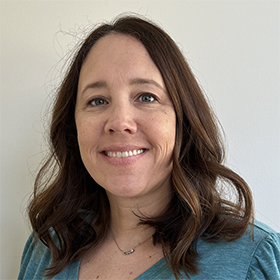
Article
March 8, 2023
Written by Brenda Gillen
Graduate’s Psychological Safety Study Could Change Nursing Education
A University of Northern Colorado graduate’s dissertation has the potential to change education for nursing students everywhere.
A University of Northern Colorado graduate’s dissertation has the potential to change education for nursing students everywhere.
“My two loves are nursing and education. I’m interested in trying to figure out how we can teach the next generation better and make them more prepared,” said Melissa Anozie.
The recent graduate from UNC’s Ph.D. in Nursing Education program was awarded a Graduate Dean’s Citation for Outstanding Dissertation for her study “It’s More Than Nursing: The Experiences of Psychological Safety of Prelicensure Nursing Students that Identify as Black, Indigenous, and People of Color.”
Anozie interviewed 11 students from different schools, backgrounds and locations. She found their past experiences influenced their present-day feelings of psychological safety — how one determines if it’s safe to speak up.
“Everything they’ve gone through culturally or upbringing-wise, affects how they process safety in that class environment with faculty,” Anozie said. “For their personal needs, they chose to be quiet most of the time. But all of them told stories about how they would speak up for patients.”
Anozie, who lives in Southern California, participated in UNC’s Extended Campus online + Colorado visits delivery of the Nursing Education doctoral program. Despite the distance, she made strong connections with her cohorts.
“There were 10 of us at our in-person orientation, and that initial meeting was really helpful in starting to get to know people,” said Anozie.

Originally from Hawaii, Anozie attended California Baptist University on a basketball scholarship. There, she earned a B.S. in Kinesiology and Exercise Science. She returned to CBU for her registered nurse license and an M.S. in Nursing Education. After working as an RN for Community Hospital of San Bernardino for five years, she was hired as an assistant professor of nursing faculty at CBU in 2014.
“My husband is from Nigeria, so my daughter will probably identify as BIPOC. And it came to me, let’s study this population. I thought if BIPOC students would share their experiences, chances are all our students would be better prepared to care for a diverse population. My daughter will likely go through some of the same things as other BIPOC students when she’s in school. This study gave me insight as a nurse educator and a parent,” said Anozie.
Associate Professor Mike Aldridge, the associate director for the School of Nursing, headed Anozie’s dissertation committee. Aldridge was joined on the committee by nursing faculty members Assistant Professor Natalie Pool and Associate Professor Jeanette Adams McNeill; and Heather Helm, professor and chair of Applied Psychology and Counselor Education, who served as the faculty representative.
“They were all very helpful in different ways as they brought different strengths. They were supportive, honest, and encouraged me to make it a better study, ”Anozie recalled.
Aldridge approached the role of research advisor similar to mentoring a future colleague by offering thoughtful insights about interview questions and interacting with participants. As self-sufficient as Anozie was, he knew from experience that many doctoral students have a crisis during their dissertation.
“I was driving home, and Melissa called. I remember pulling over in a gas station parking lot and talking with her. A site she had approached either didn’t want her to do the study at their site or they had conditions that were not acceptable to maintain the integrity of the research. She came up with a new recruitment plan, and ultimately got even more meaningful results,” said Aldridge.
Anozie said garnering the dean’s citation was “shocking and humbling.” “I’m honored that this work will help change nursing education, which will help improve outcomes as we care for patients,” Anozie said.
Next, she plans to publish her findings in a nursing education journal.
“Melissa’s study tells us we have some serious issues in nursing education that we need to address to improve the experience for students,” Aldridge said, noting that the topic aligned with UNC’s Ph.D. in Nursing Education program because it related to how educators teach students and contributed to understanding students’ experiences.
The ripple effects of her research began in Anozie’s own classroom, where she has since created implicit bias assignments for her first-semester nursing students. Previously, when new nursing students asked about assignment due dates, she encouraged them to look them up. With the results from her study, Anozie realized that such a curt response kept students from asking new questions.
“Now I say, ‘That assignment is due this day. In the future, go ahead and look in the syllabus.’ So, I answer their questions but try to help find ways for them to be more independent in moving forward,” Anozie said.



